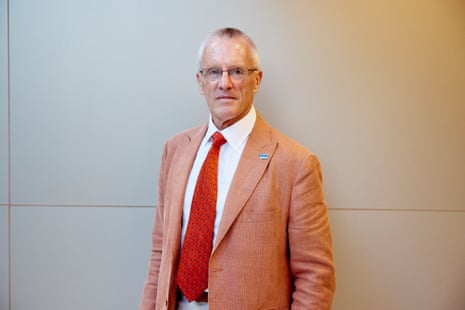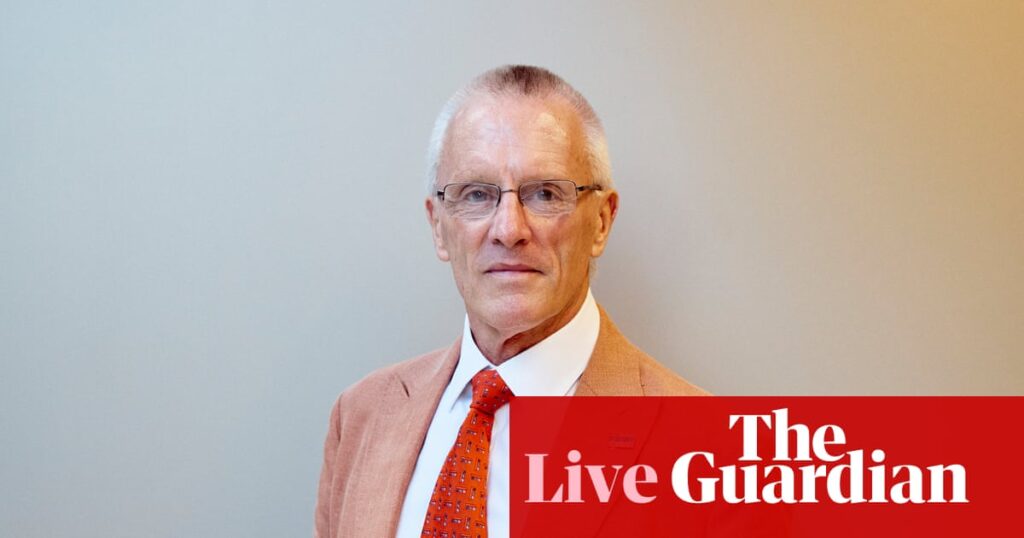One Nation senator Warwick Stacey resigns

Josh Butler
Pauline Hanson said this morning One Nation senator Warwick Stacey, elected at the May election, is resigning for health reasons.
Stacey was elected as a senator for NSW and helped double One Nation’s Senate numbers from two to four. He said in a statement he was dealing with “personal health issues”.
Unfortunately, I will be unable to fully dedicate myself to the role as I deal with my personal health issues.
I don’t think a person elected to parliament should be anything less than completely dedicated to a role entrusted to them by voters, so I’m resigning to make way for someone who can do that on behalf of the people of NSW.
Stacey was only sworn in as a senator a few weeks ago in the opening fortnight of parliament. Stacey confirmed his resignation in a phone call with Guardian Australia.

Key events

Tom McIlroy
Conservation group says roundtable must protect both economy and the environment
The economic reform summit in Canberra is hearing from the Reserve Bank governor, Michele Bullock, this morning, before moving on to sessions about “international risks, opportunities and trade”.
Ahead of participating in the event on Tuesday, the Australian Conservation Foundation says the talks must boost both the economy and protection of the natural environment.
Chief executive Kelly O’Shanassy will be present for talks on better regulation and approvals and will call for changes to the national environmental laws to keep major approval powers with the federal government. She said:
Better coordination across federal, state and territory governments is needed, but the simplistic idea of handing over Commonwealth responsibilities to state and territory governments for ‘single touch approvals’ won’t work.
Among other contributions, O’Shanassy will call for new national environment standards, to define the rules on nature protection and guide project proponents on where they can build and where nature needs to be protected.
She said an independent national environment protection agency is needed to administer the standards, “through making assessment and approval decisions, ensure compliance and enforcement and oversee any accredited arrangements that allow for further efficiencies.” O’Shanassy said:
Faster decisions are crucial, as is stronger nature protection. Australia’s failed national nature law facilitates neither.
The national nature law contains a series of convoluted processes with no defined outcomes or transparent institutions – a recipe for slow, unpredictable decisions and ecological and economic decline.
iiNet reports cyber incident with 280,000 email addresses taken
Internet provider iiNet has just reported a large cyber incident after an unknown third party accessed its systems. The company said:
iiNet has been impacted by a cyber incident involving unauthorised access to its order management system by an unknown third party.
The system contains limited personal information. Importantly, it does not contain copies or details of customer identity document details (such as passport or driver’s licences), credit card or banking information.
The company said it confirmed the incident on Saturday 16 August and enacted its incident response plan to determine the extent of the breach. It said a list of email addresses and phone numbers had been hacked from its system, including 280,000 active iiNet email addresses, 20,000 active landline phone numbers, as well as some inactive email addresses and numbers.
About 10,000 iiNet usernames, street addresses and phone numbers, as well as 1,700 modem set-up passwords, were also taken. The company said:
iiNet urges our customers to remain vigilant, especially to any suspicious communications received via email, text or phone call. If in doubt, contact iiNet directly or seek independent advice from trusted sources, including the Australian Cyber Security Centre.
More details are here.

Petra Stock
Analysis reveals Australia’s largest gas guzzlers
Australia’s liquefied natural gas (LNG) export industry uses 13 times more gas than local manufacturing, according to new analysis by climate activist group Market Forces.
The vast majority of gas used in Australia is directed towards LNG exports, followed by gas power plants and manufacturing, according to the report. Only 10 facilities – mainly those producing alumina and ammonia – made up more than half of manufacturing gas use.
According to Market Forces estimates, the five largest manufacturing gas users could require carbon offsets up to $1.3bn over the decade if they failed to reduce their reliance on gas.
Kyle Robertson, Market Forces’ head of research, said
Australia’s biggest manufacturers, particularly alumina and ammonia producers, need to immediately step up and invest much more in the transition to renewable energy.
Manufacturers guzzle a lot of our gas but 13 times more is gobbled up, turned into liquified natural gas and sent overseas.

Patrick Commins
Canavan to convene rebel roundtable on energy prices
While the government’s anointed luminaries are huddled in the cabinet room without their mobile phones and natural light, Matt Canavan plans to convene a “real” productivity roundtable on the grass in front of parliament house.
Senator Canavan has joined fellow National Barnaby Joyce in calling for getting rid of the net zero target and replacing renewable energy with new coal plants.
So it’s no surprise that the rebel roundtable late tomorrow morning will address what they call “the elephant in the room”: rising power prices.
Canavan and a staffer have been walking the halls of parliament house this morning wearing T-shirts emblazoned with “Energy prices are the real productivity issue”.
The AFR has reported that a former Productivity Commission chair, Gary Banks, will give a keynote speech. Other invitees reportedly include an ex-Business Council of Australia boss Tony Shepherd and an executive of the Housing Industry Association, Simon Croft.

Luca Ittimani
BHP hikes profits, but pays $4bn less in Australian tax
Mining giant BHP paid $4bn less in Australian tax while hiking profits over the year to June after iron and coal prices slid, as the company hikes copper production to switch towards green industry.
The price BHP received for its steel making coal prices fell nearly 40% in 2024-25 compared to the previous year and energy coal prices fell 10%. The company’s coal output fell after it sold two mines and wet weather slowed down truck productivity.
BHP’s annual report, out today, said Australian coal supply would likely recover but said Queensland’s coal royalty scheme had discouraged it from long-term investments in local mining, joining other miners’ criticisms.
Iron production increased but prices fell by a fifth, with BHP predicting resilient Chinese and Indian demand would keep commodity markets moving but noting tariffs were dragging global economic growth. Together, that saw global revenue fell by US$4.4bn to US$51.3bn.
Tax payments in Australia fell even further, as the company reduced its effective tax rate from 33% to 32.1%. Once you add royalty payments, BHP paid A$10.5bn (US$6.8bn) in tax in 2024-25, an A$4bn (US$2.7bn) fall from A$14.5bn (US$9.5bn) the previous year.
BHP’s tax payments in Chile doubled to US$3.2bn as it hiked production at the world’s largest copper mine, Escondida. The company produced 2 Mt of copper over the year for the first time – less than 1% of its iron output – but it hopes to double output from South Australia and has more projects in the pipeline.
More efficient copper mining helped profits rise over US$1bn to US$9bn. Copper is playing an increasingly important role in the business, now responsible for almost half of underlying earnings. The metal’s importance to green technology has driven up global demand and prices.

Josh Butler
Hanson describes Stacey as a ‘man of principle’
One Nation will get to name someone as his replacement “in coming weeks”, Hanson’s office said, which will keep the party’s Senate numbers at four. The party is not yet naming that replacement. Hanson said:
It is with profound regret that we farewell him from the Senate so soon after he was elected.
I was delighted when it was announced Senator Stacey had won a seat representing NSW. I knew he would bring a wealth of knowledge, experience and expertise to our team along with the strong conservative values that made Australia great.
I wish Senator Stacey all the very best with his health and his future.
One Nation senator Warwick Stacey resigns

Josh Butler
Pauline Hanson said this morning One Nation senator Warwick Stacey, elected at the May election, is resigning for health reasons.
Stacey was elected as a senator for NSW and helped double One Nation’s Senate numbers from two to four. He said in a statement he was dealing with “personal health issues”.
Unfortunately, I will be unable to fully dedicate myself to the role as I deal with my personal health issues.
I don’t think a person elected to parliament should be anything less than completely dedicated to a role entrusted to them by voters, so I’m resigning to make way for someone who can do that on behalf of the people of NSW.
Stacey was only sworn in as a senator a few weeks ago in the opening fortnight of parliament. Stacey confirmed his resignation in a phone call with Guardian Australia.
Sussan Ley says all Australians should be ‘very sad’ about state of relationship with Israel
Opposition leader Sussan Ley was just asked about Israel’s decision to revoke some visas for Australians to the Palestinian Authority. Ley said she really regrets “the way that the relationship between the Albanese government and the government of Israel is deteriorating”.
She told the press in Sydney:
That is something all Australians should be very sad about today. Israel is a liberal democracy in the Middle East and we should be supporting them as that liberal democracy and the steps that the Albanese government has taken over recent days and weeks certainly have not demonstrated that.
This is an elected member of the Israeli parliament and it’s a very unusual thing to refuse a visa and I haven’t seen explanations from Tony Burke that actually explain what is going on here.
The politician in question, Simcha Rothman, is a far-right member of Israel’s parliament. He has described Palestinian children in Gaza as “enemies” and called for Israel’s total control of the West Bank.

Josh Butler
Oh, the table is oval
The roundtable – which is actually occurring around the long oval table of the cabinet room – today features the likes of the NSW treasurer, Daniel Mookhey, the independent MP Allegra Spender, the secretaries of key government departments, unions bosses Sally McManus and Michele O’Neil, business leaders Innes Willox and Andrew McKellar and the RBA chief, Michelle Bullock.
Sitting on the far rounded edge of the cabinet table – as far from Albanese as would be possible – is the Liberal deputy leader and shadow treasurer, Ted O’Brien.

Josh Butler
Behind closed doors, roundtable begins in earnest
The economic roundtable has gone behind closed doors in the cabinet room, so we’re left to wait and wonder what’s going on in there. As we leave the boffins to their discussions, one person joked to us this morning that it was like a papal conclave – doors sealed, onlookers anticipating outside waiting for smoke signals to emerge.
We managed to nip inside the cabinet room earlier as Albanese and Chalmers made their opening addresses. The prime minister said he didn’t expect the assembled participants to agree on every issue (with the unions, business groups, environment leaders and politicians in one room, it’s probably hard to agree on the lunch order, let alone the future economic direction of the country), joking that he would be shocked if they reached a settled consensus position on thorny topics like artificial intelligence this week.
But in the spirit of consensus (a word you’re hearing a lot this week) Albanese invited all the roundtable members to drinks at the Lodge tomorrow night.
We’ve been ushered out of the room by the PM’s media team, and while we leave the economic titans to their own devices, even the participants have not been left to their own (electronic) devices – phones, watches and other tech gear have had to be surrendered at the door.
A few desks full of electronics were seen by the door of the cabinet room, held in little plastic boxes with each leader’s name on a sticky note. We hope there’s no mix-up on the way out, and that they’ve all since been turned to silent after one phone and watch started prominently buzzing just moments into the three-day meeting, a deafening ringtone interrupting Chalmers’ opening address.

